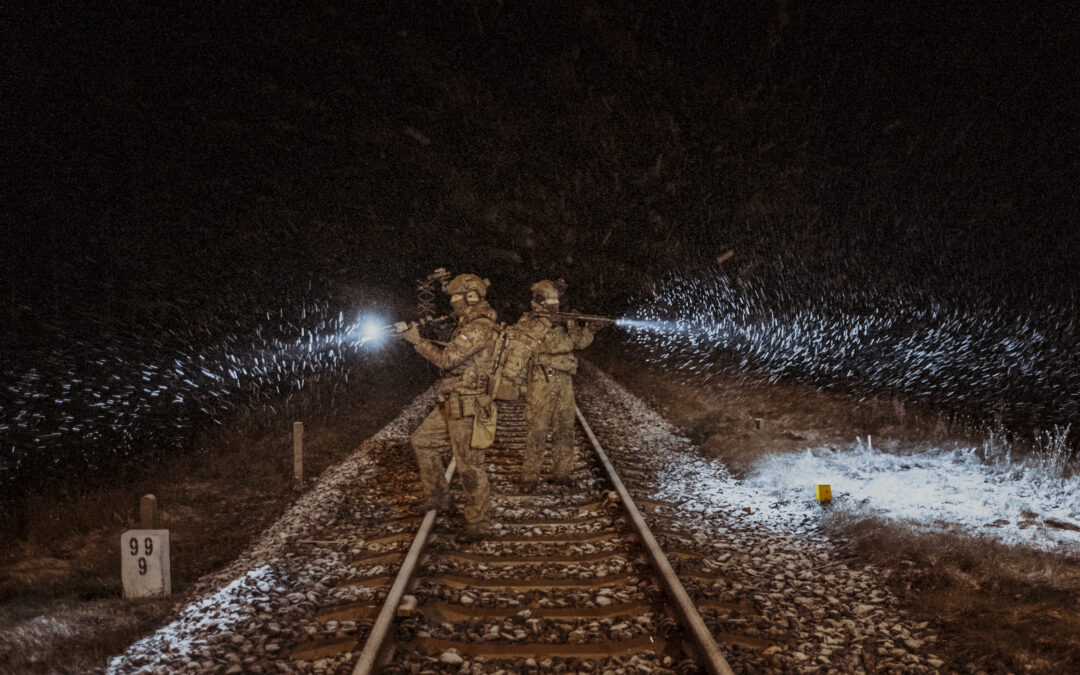The Polish authorities have denied reports by NGOs that a four-year-old Iraqi girl is lost in a forest on the country’s border – where temperatures have been dropping to -15°C (5°F) at night – after being separated from her parents when they were sent back to Belarus after crossing into Poland.
A spokesman for the Polish security services said the “rumours” have been spread “without any verification” and have become “the basis of media hysteria”.
[2/2] Her parents’ phones were destroyed during pushback. They can’t send us any pictures. We know that the girl was wearing red jacket. It is -12 degrees in the forest. She may not survive the night.
— Fundacja Ocalenie (@FundOcalenie) December 7, 2021
“Tonight, a couple from Iraq was deported from Poland to Belarus, while their four-year-old daughter Eileen stayed in the woods on the Polish side,” wrote Grupa Granica (Border Group), an NGO, on Tuesday night.
It accused Polish border guards of causing Eileen to be separated from her parents, “which resulted in the disappearance of the girl and the risk to her life”.
The NGO said her location was unknown, although they had “alerted the relevant institutions in the morning”, and called for rescue teams to search the area until she was found. “Eileen has no chance of surviving in the woods,” they said.
Another humanitarian group, Fundacja Ocalenie (Rescue Foundation), wrote that the phones of Eileen’s parents “were destroyed during pushback” across the border and so no photos of the girl were available. But they said that she was wearing a red jacket.
The public appeal was answered by Poland’s border guard on Tuesday evening, which said that they had not detained any families with children over the past day. “There were no children among those who tried to cross the border,” they tweeted.
The border guard confirmed that, after receiving a request from Grupa Granica, “the area was searched from land and air for several hours”. It was also monitored during the day and night using night-vision and thermal systems.
Grupa Granica have also appealed to the Polish authorities to grant permission for its volunteers to enter the border zone to help search for the girl. Currently, entry to the area is forbidden for non-residents – including NGOs and journalists – under a recently passed law.
Nie ujawniono żadnych dzieci na odcinku ochranianym przez placówkę SG w Nowym Dworze ani na pozostalych. W nocy granica,a zwłaszcza odcinki gdzie były próby jej nielegalnego przekroczenia, były patrolowane i z lądu i z powietrza, z użyciem systemów noktowizji i termowizji.2/2
— Straż Graniczna (@Straz_Graniczna) December 7, 2021
The spokesman for Poland’s security services, Stanisław Żaryn, tweeted yesterday evening that the claims about Eileen are “another untrue story that became the basis of media hysteria without any verification”.
He criticised “activists [for] spreading rumours about an allegedly lost child” based, claimed Żaryn, upon “a photo of a children’s shoe that foreigners showed to the activists”.
Kolejna nieprawdziwa historia, która bez żadnej weryfikacji stała się bazą histerii medialnej.
Tym razem aktywiści nagłośnili plotkę o rzekomo zagubionym dziecku. Za dowód posłużyło… zdjęcie dziecięcego buta, które cudzoziemcy pokazali aktywistom. https://t.co/Mj0CAfzlEm
— Stanisław Żaryn (@StZaryn) December 7, 2021
Tens of thousands of attempts to cross into Poland from Belarus – mainly by people from the Middle East – have been made this year. After peaking in October and early November, the crisis has eased somewhat after thousands of migrants were repatriated and harsher weather conditions set in.
But yesterday border guard spokeswoman Anna Michalska warned that, despite a drop in attempted crossings, the migratory pressure was being “artificially controlled” and that “there might be more migrants, more foreigners at any moment”. Belarus has been orchestrating the crossings.
There are also fears that, even if fewer people try to cross the border, winter weather conditions could worsen the humanitarian crisis. Last week, a Kurdish woman died after suffering hypothermia following a week living in the forest with her family. Ocalenie said that she was the 19th fatality of the crisis so far.
Main image credit: Polish Territorial Defence Forces via KPRM/Flickr (under CC BY-NC-ND 2.0)

Maria Wilczek is deputy editor of Notes from Poland. She is a regular writer for The Times, The Economist and Al Jazeera English, and has also featured in Foreign Policy, Politico Europe, The Spectator and Gazeta Wyborcza.




















